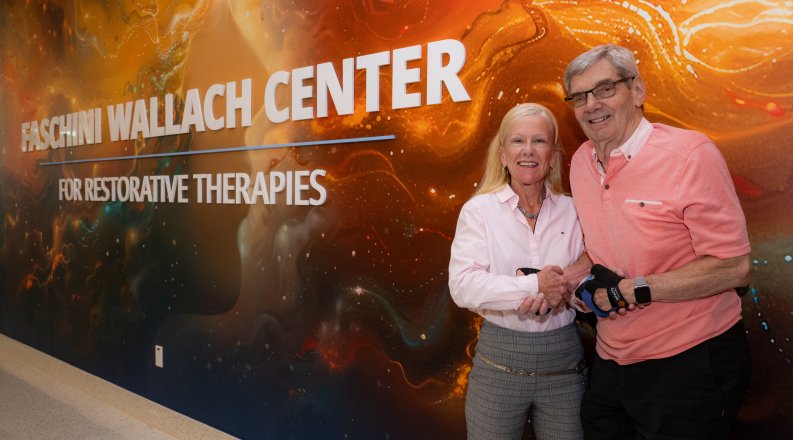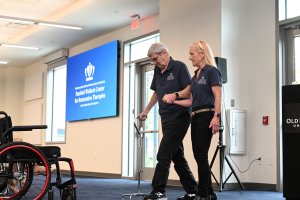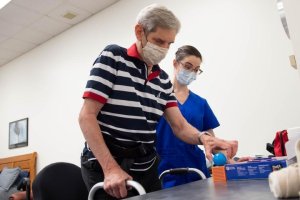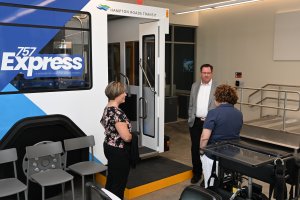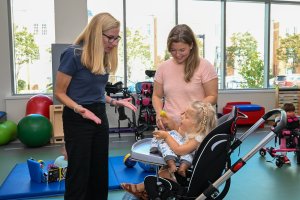By Harry Minium
It was December 2019 and Andy Wallach was in a Florida hospital after suffering traumatic injuries during an accident in an All-Terrain Vehicle.
Doctors told his wife, Cynthia Faschini, that he would never walk again and that he had no better than a 50 percent chance of living a year.
Almost five years later, Andy is still very much alive and kicking, as was clearly apparent on Saturday morning when Old Dominion University dedicated a portion of the Ellmer College of Health Sciences building as the Faschini Wallach Center for Restorative Therapies.
Andy walked – with the aid of a walker – with Faschini by his side as they stepped to the podium to dedicate the multispecialty rehabilitation center formerly known as ODU Monarch Physical Therapy.
Dean of the College of Health Sciences, Bonnie Van Lunen was joined by a host of family members and friends of Andy and Cynthia for the grand opening.
The center was named for the Norfolk couple after they established a $2 million endowment for the Faschini Wallach Center for Restorative Therapies. Funds from the endowment will be used to supplement the services that patients now receive.
It is their way of thanking ODU’s Monarch Physical Therapy for the care, both the intense therapy as well as moral support, that allowed them to put their lives back together after that terrible accident.
They are an intimately close couple who enjoy traveling and being with each other. And they enjoyed challenging physical activities while on vacation. They’ve been all over the globe and are comfortable financially.
“Life with Andy was a dream,” Faschini said of life before the accident.
But then their world came crashing down after Andy, who was at the wheel of an ATV they were riding, took an unmarked, dangerous curve a bit too fast. Both were thrown off the vehicle.
Cynthia had a broken leg and was unconscious. And that was the good news. The bad news was that Andy was near death.
His leg had so many compound fractures that it was practically severed from his body, and he was bleeding profusely. Had it not been for a group of medical personnel on an ATV that pulled up minutes after their crash, he might have died.
They applied a tourniquet which stopped the bleeding.
He tore the rotator cuff in his right arm and had a broken finger and cuts and contusions all over. Later, they learned he had suffered a spinal cord injury and was paralyzed from the chest down.
Doctors briefly considered amputating his left leg before deciding it could be saved.
He survived his injuries, but Andy’s recovery was long and painful and at first, he was almost helpless.
Getting him ready for the day took two to three hours. He could not dress himself, could not walk and had to be hoisted out of his bed each morning by a lift machine.
Cynthia was searching for a physical therapy center to help get her husband back on his feet during the midst of the pandemic. Not a lot of centers were willing to take him on.
But then a therapist at a smaller center suggested that she check out ODU.
“They’re the best,” she was told.
Cynthia called Lisa Koperna, director of ODU’s physical therapy clinic, who met with them and stunned them with one of her first questions.
“What is your goal?” she asked Andy.
“I want to walk again,” he said. “I want to be independent.”
“Let’s get busy,” she said.
For two years, ODU’s occupational and physical therapists worked with Andy three or four times a week. He was 76 at the time but had the drive of a man half his age.
He worked out every morning at home, doing weights and exercises, before going to what was then the ODU Monarch Physical Therapy clinic. Physical therapists, many working side by side with ODU students, would stretch Andy’s legs and arms and put him through a difficult regiment of exercise.
Occupational therapists would work to strengthen his grip and ability to do simple tasks, such as pick up a fork.
Several days a week he would leave the clinic and head to ODU’s Student Recreation Center, where he would lift weights as best he could.
Gradually, he began to improve. He regained movement in his legs. Then they got stronger, and he could lift them. Then he began to walk with the aid of a walker. Now, he can get undressed and go to bed by himself as well as get himself ready each morning.
He’s not good as new. “But I have a wonderful life again,” he said.
And even though he’s now 78, he continues to make progress.
“What the therapists have done for Andy at ODU is a miracle,” Cynthia said.
It is 9 a.m. on a Wednesday morning and that means Andy and Cynthia are in the building. As they enter, Andy wheels himself into the PT treatment area while Cynthia makes the rounds with all the patients, employees and anyone else who happens to be walking by.
“She knows everyone,” said John Perry, who has a spinal cord injury. “She tries to cheer people up, to make everyone feel positive.
“So does Andy. They try to help everyone.”
“They are both saints,” Lisa Koperna added. “If someone has a problem, she will try to fix it. She is caring and outgoing to everyone here. Everyone loves her.”
They love Andy, too. His enthusiasm is infectious, and his sense of humor keeps the therapists laughing. And while he is a tough guy on the outside, he has a tender heart. When he sees someone struggling with therapy, or having a bad day, he will reach out and offer encouragement.
On this day he is working with physical therapist Megan Frick, who was also a pageant queen who participated in the Miss Virginia pageant. Her talent in the contest was singing and Andy is trying to get her to sing while she tries to redirect his attention to the therapy.
“He calls me musical or maniacal depending on his mood,” Megan said. “He keeps me laughing. He’s so good to work with. He works so hard.”
With that, he stands and begins doing legs lifts. His face grimaces in pain. Rehabilitation can be like that – it strengthens your body but requires intestinal fortitude.
The setting in which he is working out is far different from the place where his therapy began. ODU’s Physical and occupational therapy departments were previously housed in a warehouse just off Killam Avenue.
The building was old and facilities bare, but ODU built a thriving practice that not only worked to heal many in the community, but also gave students practical experience in working with patients.
What was a very good thing improved dramatically when ODU moved into the new Ellmer College of Health Sciences building. With classrooms, labs and research facilities, the three-story building is home for 2,000 students enrolled in health science programs, as well as nearly 200 faculty members.
It is named for Dennis and Jan Ellmer, a Virginia Beach couple who made a generous, $20 million donation to ODU. Dennis Ellmer, who founded Priority Automotive, also serves on ODU’s Board of Visitors.
It is also home to the Sofia and David Konikoff Dental Hygiene Care Facility. It is also home to the Sofia and David Konikoff Dental Hygiene Care Facility. In this facility, students from the Gene W. Hirschfeld School of Dental Hygiene provide quality preventive care for patients under the supervision of licensed dental hygiene faculty.
The Faschini Wallach Center has amazing facilities. There is a fully furnished apartment where patients can practice getting in and out of bed, using the restroom, cooking and doing the laundry. Hampton Roads Transit donated a bus that allow patients to practice getting on and off a bus.
There is also a car, donated by Aristocrat Towing, to help patients learn to get in and out of an automobile.
One afternoon, as Andy walked through the first floor, and admired the atrium ceiling and watched students scurrying to class, he stopped and smiled.
“The people here did so much good, they helped so many people, in the old facility,” he said. “Imagine what they are going to do for people here.”
Cynthia and Andy are serving a meal in their Colonial Place home to guests, including Manisha Sharma, a major gifts officer who helped facilitate their donation.
While eating, they also answer questions about why they donated $2 million of their hard-earned money to ODU.
“We realize how fortunate we are,” Andy said.
They had the money to pay for the best care and Andy has a dedicated wife and family who offer him tons of support.
“Not everyone has that kind of support,” Cynthia said. “Often, after someone suffers a major injury, the spouse just can’t handle it and leaves. That doesn’t mean they are bad people. It means that they could just not handle it.”
This is in part why they donated the $2 million, to help patients without a lot of moral support at home.
The $2 million will never be touched and theoretically will help patients many decades into the future.
“We did this is because of the progress Andy made from his initial diagnosis to where he was two years ago,” said Faschini of the donation they pledged in 2022. “What happened there exceeded my wildest dreams.
“It made such an impact on us that we wanted to give back. Not just give back to the others around us but to the community and to the commonwealth.”
“Their very generous gift will be spent wisely,” Koperna said. “All of it will be used to provide more support and resources for others. We’ve promised them we would do that."
“What we hope happens is that this money will provide the kind of extra help that we had,” Cynthia added. “We want this to help patients beyond physical and occupational therapy.”
It could pay for new equipment or emotional support that could help patients. “The physical and occupational therapy is wonderful, but you have to do more if you’re going to make improvement,” Andy said. “We hope this gift will enable patients to do more.”
Andy said that therapists at ODU do far more than punch a timecard.
“They get down on the mat and work with you,” he said. “Their dedication is amazing.
“They inspire you. They lift you up. You can’t get anybody to work unless you inspire a patient. And they inspired me every day.”
The person they appreciate most is Lisa Koperna.
“None of us would be here without Lisa,” Cynthia said. “She (led the team that) started physical therapy services at ODU. This was her creation.”
Andy and Cynthia live close to a normal life. They travel together. Andy can take care of himself while Cynthia goes out to play golf. At night, they are able to do something many couples can’t do after one suffers a serious injury.
“We cuddle every night. We kiss every night,” Cynthia said. “There is a direct correlation between kissing your spouse at night and going to sleep. We’re fortunate that we can. “Not everyone can do that after an injury like Andy’s.”
“We’ve been so fortunate,” Andy added. “We want to share some of that fortune with others.
“This experience has been a challenge, especially for Cynthia. She has done and continues to do so much for me. But we are closer than we’ve ever been. Some people I’m sure feel sorry for me.
“But in so many ways, I consider myself a very lucky man. Our love, our relationship, has grown stronger through it all.”
Koperna has seen that happen up close.
“Their story is so inspiring,” she said. “It is truly a testament to the power of hope, generosity, love, medicine and miracles.”



